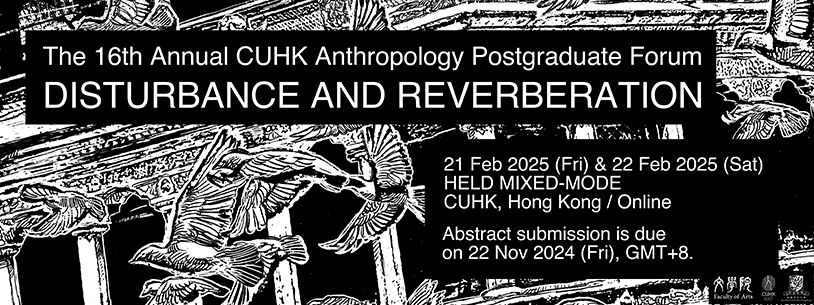We are constantly challenged by disturbances; as agentive actors, human beings are rendered vulnerable facing the unknown, unforeseen, and unprecedented. But there is no other way out except to reverberate within these disturbances. The perception of disturbance is always linked with disorder, confusion, and chaos, which overwhelms us with an atmosphere full of unsettling tensions. However, what we call disturbance is also where changes unfold. People forge solidarity while feeling vulnerable, learn fresh ideas when the old ones are obsolete, and create new order out of the decadent. Indeed, disturbances always vibrate our world, but so do our connections, which reverberate the warm sense of togetherness to the surrounding others. Reverberation is about intensity, but whether fleeting or enduring, we are emanating support and hope in this precarious world.
我們不斷遭受到擾動的挑戰;作為行動者的人類在面對未知,不可預見甚至前所未有的情況時,往往會感到脆弱不堪。但除了與這些紛擾相共振,迴響以外,我們別無他法。人們關於擾動的認知總是與無序,迷亂和混沌聯繫在一起,而這種認知將我們籠罩在充滿不安張力的氛圍之中。不過,我們所說的紛擾也在孕育著轉機。人們會在感到脆弱時團結一致,會在思想落後時推陳出新,也會在荒蕪頹廢中建立新秩序。的確,紛擾本身總是在顫動著我們的世界,但我們彼此之間的聯繫也同樣如此----它讓和睦溫情不斷地在人們身邊傳遞。迴響與強度緊密相關,但無論它轉瞬即逝或經久不衰,我們都在這個風雨飄搖的世界播撒關懷和希望。
Experiencing the post-COVID world with daunting challenges, we attempt to inquire again about issues of individuals and institutions, human beings and the environment, and social injustice and inequality. Listening to the often-silenced voices, anthropologists today are still dedicated to revealing the existing forms of negotiation and resistance to structural and literal violence, highlighting the moving stories about reverberating humans in their life worlds. What is disturbing different subjects? How can we trace trajectories of disturbances in the network across the boundaries? How do people dwell in this disorienting living condition? How do human beings imagine and engender possibilities? We seek papers that aim to discuss and debate the notion of disturbance and reverberation within anthropology and related disciplines. Encouraged topics and themes include but are not limited to:
當體驗這個面臨嚴峻挑戰的後疫情世界時,我們希望再次探究個體與機構、人類與環境、社會不平等和不公正等議題。時至今日,人類學家仍在聆聽著那些被湮沒的聲音,致力於昭示現存的對於結構性暴力甚至實質性暴力的討論與反抗,同時凸顯出人們生活中的動人故事。是什麼在干擾不同的主體?在跨越邊界的社會網絡中,我們如何追蹤擾動的軌跡?在迷惘的生活情形中,人們如何找尋自身的棲所?人們如何想像與創造出可能性?我們徵集的論文旨在研討和辯論人類學及相關學科中擾動與迴響之概念。我們鼓勵的主題包括但不限於:
- Political/social violence and community engagement
- Aspirations within economic precarity
- The discourse of normativity and insecurity
- Haunting heteronormativity and troubled gender
- The disturbing globalization and ambiguous identities
- The embodiment of vulnerability and affective connections
- Anthropogenic interruption and conservation
- Climate change and everyday perceptions
- Disturbances as symbols and their (re)circulation and (re)generation
- The echo of disturbances in history/historiography
- Disturbance and its reflection on material culture
- Technology as development and as disturbance
- Disturbances in traditional and alternative medicine
- Anthropology and its reverberation in the vibrating world
- 政治/社會暴力與社區參與
- 經濟不穩定中的渴望
- 常態性和不安定性的話語
- 陰魂不散的異性戀本位與紛擾的性別
- 焦心的全球化與模糊的身份
- 脆弱性的具身化與情感聯繫
- 人類活動造成的阻礙與保護
- 氣候變化與日常感知
- 作為象徵符號的擾動及其(再)流通和(再)生成
- 擾動在歷史/歷史學中的迴響
- 動盪及其在物質文化中的反映
- 作為發展和擾動的技術
- 傳統與替代醫療中的擾動
- 人類學及其在顫動世界中的迴響
These are a few specific approaches to the theme of disturbance and reverberation, and we wish to hear more perspectives and interpretations. As anthropologists we aspire to unsettle commonsensical notions and even “disturbance” and “reverberation” themselves, hoping to vibrate/liberate our minds from the burden of hierarchical norms. And most importantly, we seek the vibratory energy that you bring.
以上是針對“擾動與迴響”這一主題的少許具體研究途徑。同時,我們也希望聽到更多的觀點和解讀。作為人類學人,我們渴望打破常識性的概念,甚至包括“擾動”與“迴響”這對概念本身。由此,我們希望將自身的思想從等第規範的重負中振動/解放出來。而最重要的是,我們期待你們帶來振動不息的能量。
The 16th Forum Committee
CHEN Tiankuang
LYU Zihan
CHEN Wenzhao
CHANG Lei
Juliette WU
Sponsors
Department of Anthropology, The Chinese University of Hong Kong
Faculty of Arts of The Chinese University of Hong Kong
Contact us
NAH 407, Humanities Building, New Asia College,
The Chinese University of Hong Kong, Shatin, N.T.
Hong Kong
Email:
anthforum@cuhk.edu.hk
